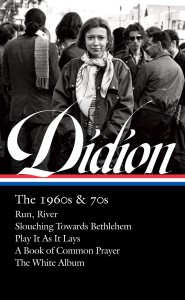
David L. Ulin (Editor)
Joan Didion: The 1960s & 70s
(Library of America, November 2019)
Library of America launches a definitive collected edition of one of the most original and electric writers of our time with a volume gathering her five iconic books of the 1960s & 70s
Joan Didion’s influence on postwar American letters is undeniable. Whether writing fiction, memoir, or trailblazing journalism, her gifts for narrative and dialogue, and her intimate but detached authorial persona, have won her legions of readers and admirers. Now Library of America launches its multi-volume edition of Didion’s collected writings, prepared in consultation with the author, that brings together her fiction and nonfiction for the first time. Collected in this first volume are Didion’s five iconic books from the 1960s and 1970s: Run, River, Slouching Towards Bethlehem, Play It As It Lays, A Book of Common Prayer, and The White Album. Whether writing about countercultural San Francisco, the Las Vegas wedding industry, Lucille Miller, Charles Manson, or the shopping mall, Didion achieves a wonderful negative sublimity without condemning her subjects or condescending to her readers. Chiefly about California, these books display Didion’s genius for finding exactly the right language and tone to capture America’s broken twilight landscape at a moment of headlong conflict and change.
Read Los Angeles Times‘ feature on JOAN DIDION: The 1960s & 70s
David Ulin shares what it was like to edit JOAN DIDION: The 1960s & 70s
Featured in The New Yorker‘s “Joan Didion’s Early Novels of American Womanhood”
Read David L. Ulin’s interview with Library of America
David L. Ulin is the former Book Critic for the Los Angeles Times. A 2015 Guggenheim Fellow, his other books include: The Lost Art of Reading; Sidewalking: Coming to Terms with Los Angeles, shortlisted for the PEN/Diamonstein-Spielvogel Award for the Art of the Essay; Labyrinth; and The Myth of Solid Ground: Earthquakes, Prediction, and the Fault Line Between Reason and Faith, which was selected as a best book of the year by the Chicago Tribune and the San Francisco Chronicle. He is also the editor of three anthologies, and his writing has appeared in the Atlantic Monthly, The Nation, The New York Times, Bookforum, The Paris Review, Zyzzyva, and on National Public Radio’s All Things Considered.
